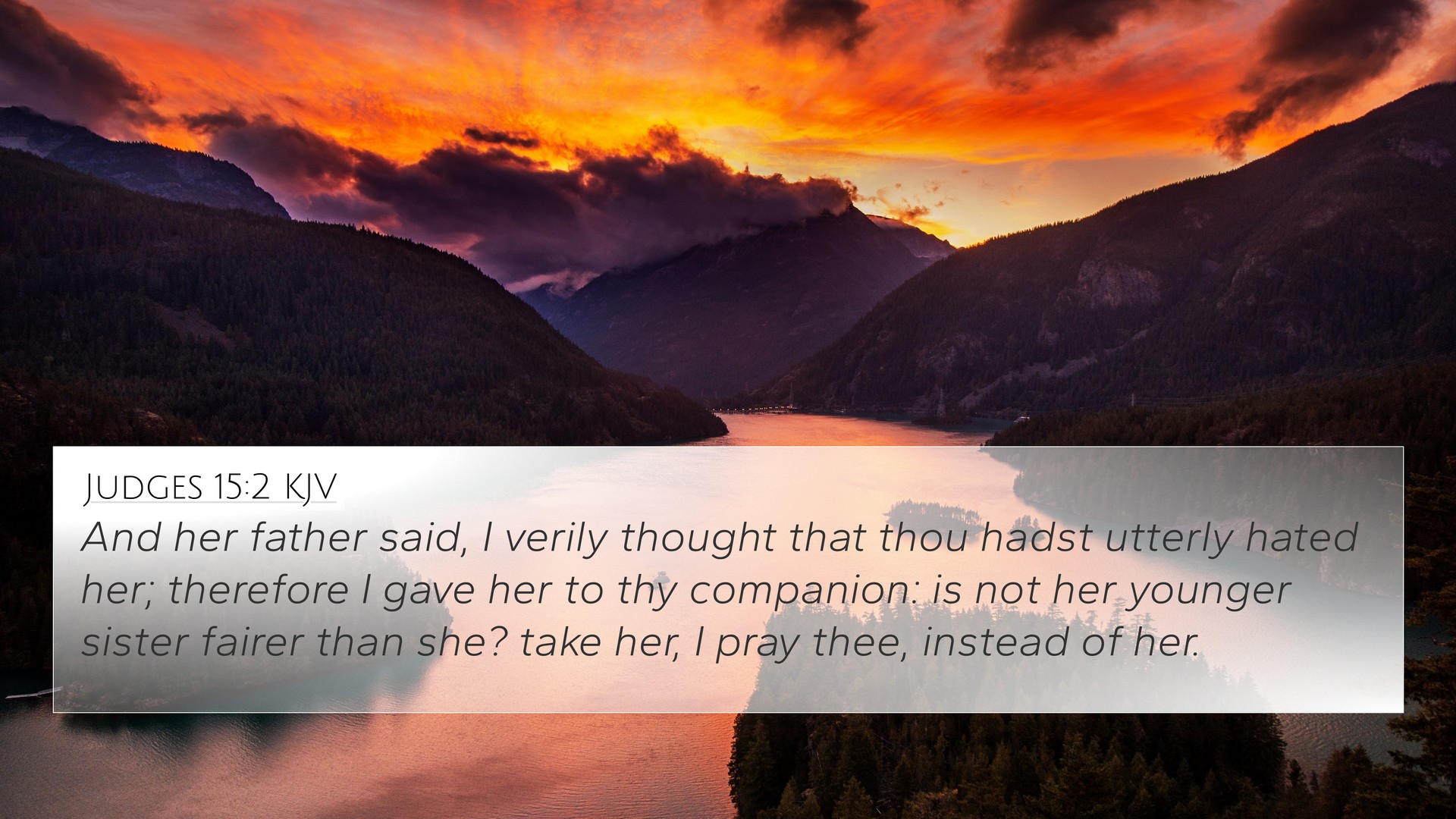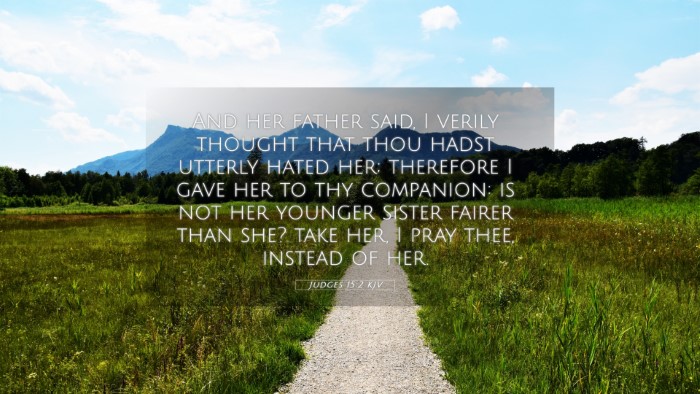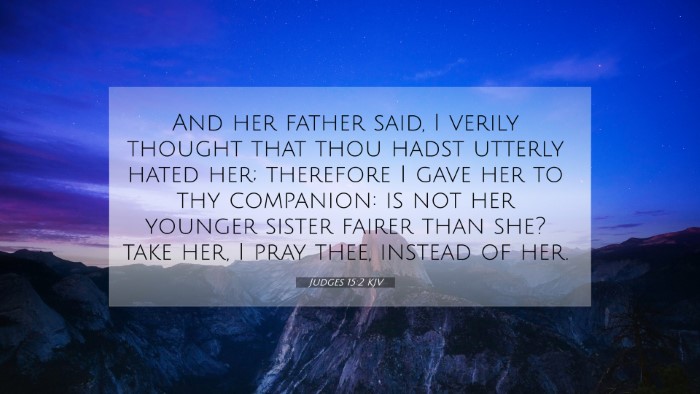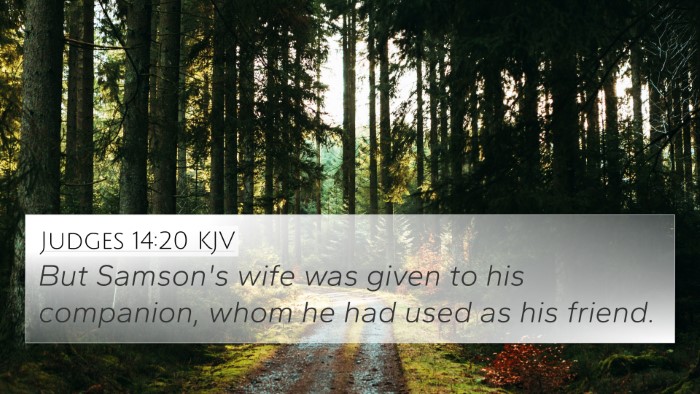Old Testament
Genesis Exodus Leviticus Numbers Deuteronomy Joshua Judges Ruth 1 Samuel 2 Samuel 1 Kings 2 Kings 1 Chronicles 2 Chronicles Ezra Nehemiah Esther Job Psalms Proverbs Ecclesiastes Song of Solomon Isaiah Jeremiah Lamentations Ezekiel Daniel Hosea Joel Amos Obadiah Jonah Micah Nahum Habakkuk Zephaniah Haggai Zechariah MalachiJudges 15:2 Similar Verses
Judges 15:2 Cross References
And her father said, I verily thought that thou hadst utterly hated her; therefore I gave her to thy companion: is not her younger sister fairer than she? take her, I pray thee, instead of her.
Uncover the Rich Themes and Topics of This Bible Verse
Listed below are the Bible themes associated with Judges 15:2. We invite you to explore each theme to gain deeper insights into the Scriptures.
Judges 15:2 Cross Reference Verses
This section features a detailed cross-reference designed to enrich your understanding of the Scriptures. Below, you will find carefully selected verses that echo the themes and teachings related to Judges 15:2 KJV. Click on any image to explore detailed analyses of related Bible verses and uncover deeper theological insights.

Genesis 38:14 (KJV) »
And she put her widow's garments off from her, and covered her with a vail, and wrapped herself, and sat in an open place, which is by the way to Timnath; for she saw that Shelah was grown, and she was not given unto him to wife.
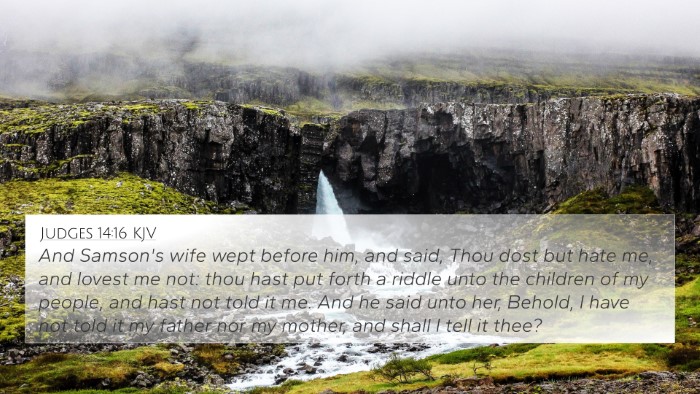
Judges 14:16 (KJV) »
And Samson's wife wept before him, and said, Thou dost but hate me, and lovest me not: thou hast put forth a riddle unto the children of my people, and hast not told it me. And he said unto her, Behold, I have not told it my father nor my mother, and shall I tell it thee?

Acts 26:9 (KJV) »
I verily thought with myself, that I ought to do many things contrary to the name of Jesus of Nazareth.
Judges 15:2 Verse Analysis and Similar Verses
Understanding Judges 15:2
Judges 15:2 states: "And her father said, 'I verily thought that thou hadst utterly hated her; therefore I gave her to thy companion: is not her younger sister fairer than she? Take her, I pray thee, instead of her.'" This verse is significant in the narrative of Samson, highlighting themes of betrayal, revenge, and the consequences of anger.
Summary of Meaning
This verse recounts an event following Samson's anger at his wedding when he discovers that his wife has been given to another man. Understanding this verse requires examining the implications of human relationships and divine sovereignty, as discussed by Matthew Henry, Albert Barnes, and Adam Clarke.
-
Matthew Henry's Commentary:
Henry emphasizes the folly of Samson’s choices and highlights the consequences of his rash actions. He points out the deep emotional turmoil that results from envy and betrayal, prompting a cycle of retribution.
-
Albert Barnes' Notes:
Barnes discusses the cultural implications of marriage in the Israelite context, suggesting that the father may have presumed Samson’s disdain for the bride due to the conflict at the wedding. This emphasizes the drastic measures often taken in revenge narratives, which mark the trajectory of Samson's life.
-
Adam Clarke's Commentary:
Clarke's insights focus on familial relationships and the cultural practices surrounding marriage. He notes that the father's offer of the younger sister reflects the practices of the time, yet speaks to a deeper human instinct for conflict resolution that often leads to further strife.
Thematic Cross-References
This verse has several thematic connections within the Bible that illustrate its implications concerning betrayal and vengeance:
- Genesis 29:21-30 - Jacob's experience with Rachel and Leah, illustrating sibling rivalry and complex marital arrangements.
- Proverbs 14:10 - "The heart knows its own bitterness," which highlights the internal struggles associated with betrayal.
- Matthew 5:38-39 - Jesus’ teaching on turning the other cheek reflects a contrast to the revenge seen in Samson’s story.
- Romans 12:19 - "Vengeance is mine; I will repay," highlighting God's role in justice as opposed to human retaliation.
- Luke 9:54 - The disciples' desire for vengeance mirrors Samson’s anger and need for retribution.
- James 4:1-2 - Describes the origins of conflicts among men, paralleling the quarrels stemming from Samson's actions.
- 1 Peter 3:9 - Encourages believers to repay evil with good, a direct contrast to Samson’s response to his wife's betrayal.
Inter-Biblical Dialogue
Examining Judges 15:2 through the lens of inter-Biblical dialogue reveals deeper insights:
- Identifying connections between Old and New Testament themes of anger and reconciliation.
- Comparative studies of narratives involving betrayal, such as the relationships illustrated in the stories of King David and Judas Iscariot.
- How the Israelite understanding of vengeance in Judges is transformed in the New Testament into a call for forgiveness and love.
Using Cross-References for Deeper Study
For those seeking to delve deeper into this verse, consider using tools for Bible cross-referencing, such as:
- Bible concordance to look up related terms and themes.
- Bible cross-reference guide to explore additional verses that resonate with or challenge the themes present in Judges 15:2.
- Cross-reference Bible study methods that allow for thematic exploration across different books.
- Bible reference resources for safeguarding accurate interpretations.
Conclusion
Judges 15:2 provides a window into the emotional struggles and cultural practices of ancient Israel. By employing cross-referencing Bible verses, readers can uncover a richer understanding of the lessons surrounding betrayal, revenge, and the divine call to forgiveness.
